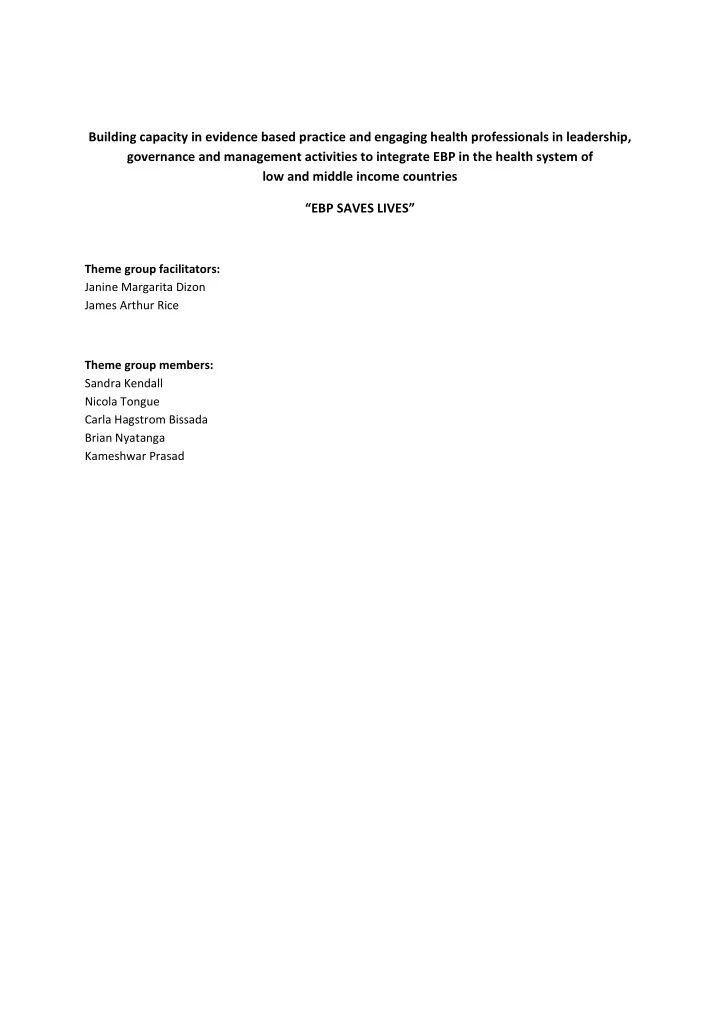

Building capacity in evidence based practice and engaging health professionals in leadership, governance and management activities to integrate EBP in the health system of low and middle income countries “EBP SAVES LIVES” Theme group facilitators: Janine Margarita Dizon James Arthur Rice Theme group members: Sandra Kendall Nicola Tongue Carla Hagstrom Bissada Brian Nyatanga Kameshwar Prasad
Background Evidence based practice is now recognized as an integral component of health care. Applying the concepts of EBP results in effective patient outcomes, efficient health systems and efficient clinical decision making. Growth of EBP in low and middle income countries is still in its infancy. Several factors make it difficult for EBP to be integrated in the health system. These factors fall into two categories: 1. Research capacity Lack of research culture Lack of organizational support Limited evidence base reflecting local scenario (traditional/cultural forms of treatment) Lack of knowledge and skills/ low level of understanding in evidence based practice Limited skills for mastery of small group teaching and learning activities essential in EBP Lack of resources essential in EBP (access to internet, access to electronic databases) 2. Leadership, governance and management capabilities Under developed culture of stakeholder engagement and inquiry Lack of strong systems that recognize and reward continuous process and improvement among clinicians as means to implement EBP Mismanaged or misused resources Under developed skills for international experience and insight exchanges by mid ‐ level leaders and clinicians Proposed strategies to address the challenges First, we identify five (5) key categories of stakeholders that must engage and collaborate to address the issues/ challenges. 1. Research and teaching faculty of academic institutions 2. Health sector clinical professionals (e.g., physicians, nurses, allied health professionals, librarians, community health workers) 3. Individuals involved in leading, governing and managing health systems 4. Technology, supply and pharmaceutical providers serving the industry; and 5. Politicians and governing bodies Second, we align strategies with these key categories of stakeholders 1. Research and teaching faculty of academic institutions
a. Fundamental EBP training to faculty and students (embedded in undergraduate and graduate education) 2. Health sector clinical professionals (e.g., physicians, nurses, allied health professionals, librarians, community health workers) a. EBP training amongst clinical professionals (lead the students and new graduates) b. Empowerment to be advocates in evidence based health care in their health systems 3. Individuals involved in leading, governing and managing health systems a. Encourage ministers of health and director generals to be aware of and be in support of evidence based health activities b. Training for good evidence based leadership, governance and management of health systems c. Those that lead, govern and manage should be encouraged to be champions for evidence based health care within their systems d. Identify and support key individuals who are able to provide more sustained activities 4. Technology, supply and pharmaceutical providers serving the industry a. Develop an understanding of and support for evidence based health care b. Take a more active role to fund and support innovations in evidence based health care 5. Politicians and governing bodies a. Develop an understanding of and support for evidence based health care b. Formulate health policies that are evidence based c. Creation of a “regulatory body” to monitor and report results of implementation of evidence based policies d. Support the development of recognition and rewards for organizations who demonstrate evidence based health outcomes Note: Training for faculty and health professionals on evidence based health practice should consider the following components based on a proposed model of EBP training as complex interventions reported in the literature. Core/Fixed components 1. Concepts of EBP 2. Steps to EBP (Sicily statement 2005) Variable components 1. Context of the health system 2. Nature of practice 3. Available resources 4. Traditional and cultural practices
Policy and culture that enables all components of evidence based health care Individuals involved in LMG activities should support evidence based health acitivites Improved EBP capacity amongst health professionals and other stakeholders Culture of research (highlight the benefits to the people) Figure 1 ‐ Factors enabling the implementation of evidence based health care activities in low and middle income countries In order to help catalyze the strategies identified above, a sample investment prospectus is provided for discussion.
Recommend
More recommend